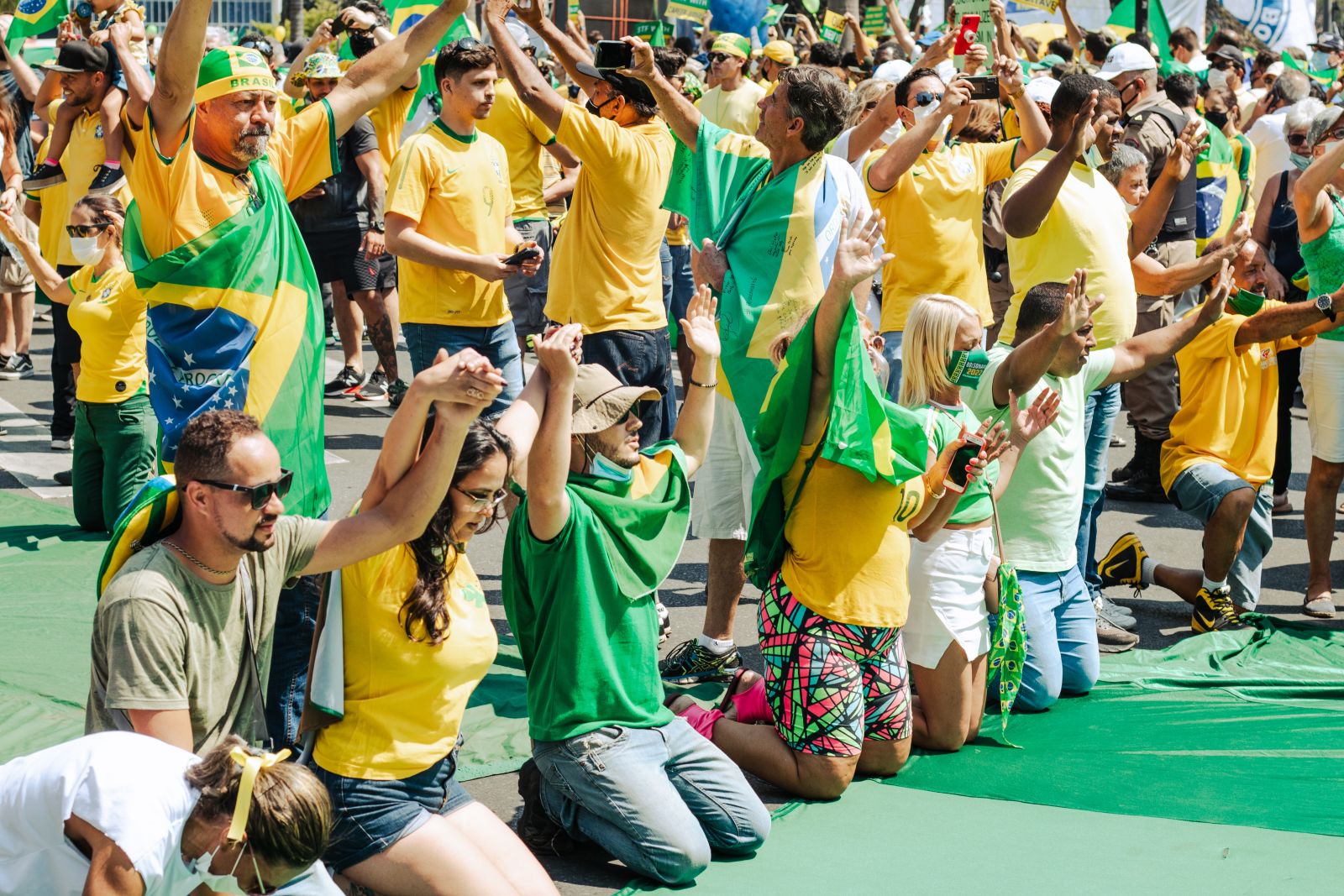Three Brazilian Scholars at the MacMillan Center on Brazil Presidential Elections (1): Julia Cani

Brazil held general elections last weekend. Two polarizing candidates, one current and one former president, battled vote by vote to get the 50% required to become elected in the first round. Neither the leftist former union leader Lula da Silva nor the rightist retired military officer Jair Bolsonaro achieved their goal. They will compete with each other on the runoff on October 30.
We wanted to know the opinion of three Brazilian women currently affiliated with the Yale MacMillan Center. They come from different disciplines (Law, History, Architecture) and thanks to three different programs (Fox Fellowship; Gilder Lehrman Center for the Study of Slavery, Resistance & Abolition; Fullbright at CLAIS.)

1) Undeniably, the 2022’s elections are particularly relevant for Brazil’s future. Nevertheless, they must be contextualized both in the national and in the international scenario. Nationally, the elections are deeply related to what happened in Brazil during the 2014 and 2018 presidential elections and, maybe most importantly, to the impeachment of President Dilma Rousseff in 2016 (when Jair Bolsonaro, then deputy, dedicated his vote against Dilma to the memory of Col Brilhante Ustra – Dilma’s torturer during the dictatorship). Workers’ Party (PT) was at the head of the Executive Power from 2003 to 2016. Luiz Inácio Lula da Silva ruled for two consecutive terms, followed by Dilma Rousseff who ruled for a full and a half term. Rousseff won the 2014 elections by a small margin of votes, the result was contested and subsequently approved by the Superior Electoral Court. Possibly, the division in society partly explains tensions in the present and latest elections. Beyond that, in 2018, Lula was arrested approximately six months before the presidential election that Bolsonaro won. Internationally, the Brazilian political scenario loosely repeated what happened e.g., in the United States with Trump, and in Hungary with Viktor Orbán. The rise of extreme right-wing governments is an international reality with common traits of authoritarianism, nationalism, anti-communism, and anti-immigration. More recently, a look at Latin America shows another trend. Left leaders took over the Executive Power as in Chile and in Colombia. Brazil can follow that path with Lula. Since Brazil’s Constitution of 1988 and until a few years ago, people have experienced a relatively stable political scenario together with the strengthening of several public institutions. Jair Bolsonaro is a risk to this democratic stability.
The rise of extreme right-wing governments is an international reality with common traits of authoritarianism, nationalism, anti-communism, and anti-immigration […] During the pandemic, Bolsonaro intentionally delayed the purchase of the vaccine, encouraged the use of unapproved medicine, and was repeatedly denounced for corruption within the Ministry of Health.
Brazil of today is worse socially, economically, and politically. Bolsonaro threatened the republic and the democratic regime by participating - as president - in rallies claiming among other things military intervention, closure of both the Brazilian Supreme Court and the Congress. During the pandemic, Bolsonaro intentionally delayed the purchase of the vaccine, encouraged the use of unapproved medicine, and was repeatedly denounced for corruption within the Ministry of Health. Nearly 700,000 people died due to Covid during his rule. Amidst several other corruption scandals, the former Minister of Education, also an evangelical pastor, was arrested due to misuse of public funds. His maintenance as the president comes at a price. Bolsonaro has benefited from the so-called ‘secret budget’- a mechanism that transfers billions from the Executive branch to deputies and senators without properly identifying the allocation of public resources – contradicting constitutional principles of transparency and impersonality. Ongoing criminal proceedings investigate the use of ‘ghost employees’ and the split of the public salary between lower-ranked officials or staffers and Bolsonaro, together with his sons. Other investigations indicate that many of the president’s properties and that of his sons and ex-wives were acquired with cash. Deforestation of the Amazon and threats to the indigenous population reached alarming levels. Bolsonaro’s actions should have been subject to impeachment in Congress and to criminal proceedings in the courts a long time ago. Bolsonaro promised economic growth, state reduction and the end of corruption. Brazil is now dealing with high and permanent inflation, has plummeted in the top international economic rankings, has innumerable civilian public administration positions distributed to the military while the government faces increasingly corruption accusations.
The continuity of Bolsonaro’s legacy will therefore be a setback for Brazil to a great extent. Media attention, however, gains special relevance when Bolsonaro’s political opponents, or its absence thereof, come to the fore. On account of the high rejection faced by Bolsonaro (Liberal Party - PL) and Lula ( PT), much was said in Brazil about a ‘third way’ candidate, that is, someone who would be capable of gathering many votes at the same time as been qualified to govern the country maintaining the rule of law. Although names such as Ciro Gomes and Simone Tebet emerged, it was oftentimes difficult to grasp if these candidates were indeed contrary to Bolsonaro. At the end, Lula was the one and only presented by the polls as having the ability to defeat Bolsonaro.
In Brazil voters tend to vote according to the candidates’ personal characteristics rather than voting for the party or consistently with the party’s orientation […] Bolsonaro’s campaign is often built on fake news, misinformation, hatred, and violence.
2) The result of the first round of this year’s elections was not what I expected. Although the polls had not presented Lula’s victory in the first term as a certainty, they indicated the possibility and I hoped that would be the case. Another aspect of the polls was that they showed a significant difference between Lula and Bolsonaro, something over ten percentage points advantage for Lula. In the end, Lula won the first turn by a difference of five percentage points, which is a much smaller difference than expected. Notwithstanding, Bolsonaro starts the runoff with a six million votes disadvantage. The third and fourth most voted candidates in these presidential elections were Simone Tebet and Ciro Gomes. Together they have 8.5 million votes and have already expressed support for Lula’s candidacy. While it is difficult to predict whether those votes will be directed towards Lula or Bolsonaro, especially considering that in Brazil voters tend to vote according to the candidates’ personal characteristics rather than voting for the party or consistently with the party’s orientation, the reasonable expectation is that they will be divided between the two candidates. Unless Bolsonaro manages to reverse the high abstention into votes supporting him - Brazil usually has an abstention rate around twenty percent of voters, which is equivalent to approximately thirty million votes – the greater the chances of Bolsonaro not winning. Be that as it may, Bolsonaro’s campaign is often built on fake news, misinformation, hatred, and violence. The second turn will be in one month and it is enough time to spread social and political insecurity. His supporters have already started claiming that the election polls were manipulated to give the general impression that Lula had more support and thus won even more votes, which is not true. A possible explanation is that either votes from undecided people or votes that would go to Tebet and Gomes migrated at the last minute to Bolsonaro. Discrediting institutions is a common practice which contributes to a scenario of general insecurity and degrades traditional characteristics of democracy. As Bolsonaro cannot allege embezzlement of votes in electronic voting machines because his party elected many deputies and senators and this would harm these elected candidates, to criticize polling numbers it’s the strategy of the time. A few hours after the end of the first round, the president of the Congress – a Bolsonaro supporter – made claims about the need to regulate polling surveys. In addition, the Minister of Justice requested investigations over the research institutes’ alleged misconduct. Bolsonaro’s campaign decided to take legal actions in the Office of the Prosecutor General before the Superior Electoral Court against polling surveys as well.
Since 2019, Bolsonaro has been cutting funds destined to education, science, and technology. Along with students being impacted on the continuity of their practical classes, research projects, and assistance programs, the systematic cut in funds makes any form of institutional planning unfeasible.
3) As I mentioned, Bolsonaro poses a risk in many ways, whether through his general administrative incompetence, the diversion of public resources, or the attacks on our democracy. To focus on just one problem, I would like to emphasize the risk of weakening democratic institutions, such as federal universities dealing with shortage on resource allocation and the Brazilian Supreme Court (STF), my specific object of research, which has been constantly targeted by Bolsonaro.

First, since 2019, Bolsonaro has been cutting funds destined to education, science, and technology. Along with students being impacted on the continuity of their practical classes, research projects, and assistance programs, the systematic cut in funds makes any form of institutional planning unfeasible. A great deal of universities ran or are still on the verge of having to close their doors, like the Federal University of Rio de Janeiro. In the last four months alone, the Ministry of Economy informed the Ministry of Education of a contingency in the budget of federal universities and federal institutes in the amount of BRL 2.4 billion. If the scarcity of public resources is the justification for such cuts on investments, the constant targeting of the contingency of funds over educational institutions rather than focusing on less essential areas makes one wonder if this is being used as a weapon of ideological warfare. Bolsonaro never concealed his thoughts on the “leftist indoctrination” that would have been installed in the country’s education system during the PT years. The financial asphyxia imposed for the last four years over those educational institutions displays a concrete dismantling for the academic field.
Second, many of Bolsonaro’s attacks were aimed at the Brazilian Supreme Court (STF) and towards some of its justices specifically. The STF operates both as a constitutional court, dealing with abstract judicial review, and as a supreme court - the highest appellate court of the Judiciary. The court decides around 100,000 cases a year, either originally or on appeal. The topics vary widely, ranging from issues regarding the pandemic to criminal proceedings against presidents and former presidents. For instance, the STF ruled the covid vaccine as mandatory (which means it can be implemented by way of indirect measures as restriction on carrying out certain activities or entering certain places instead of forced vaccination), and recognized the central role of the federal government in the planning and coordination of public actions to combat the coronavirus, but stated that, in the absence of the development of this central action, all federative entities would have autonomy to establish rules for immunization. Regarding the ‘car wash operation’, the STF ruled that the criminal proceedings against former president Lula violated due process guarantees, such as his right to be tried by an impartial tribunal, and quashed Lula’s sentence in 2021. Despite all the criticism that the court may eventually deserve, its role as a democratic institution is undeniable and deserves all protection. As I dedicate myself to studying the decision-making within the Brazilian Supreme Court, I am very much concerned Bolsonaro will seek to pack the court if he has one more term as head of the Executive Power. During his government, Bolsonaro appointed two justices and claimed he had a “part of him within the court”. About the first justice indicated he said that “he does not need to speak with” because his nominee “knows what to do”. About the second he said “I made a commitment during the campaign to appoint a terribly evangelical to the STF. And so I did. I indicated and I have a pastor there”. The next president will be entitled to make two more justices’ appointments due to retirements. Bolsonaro already declared his desire to have control over the court. Winning, he will be closer to that. Besides, he mentioned his desire to impeach some justices, and the desire to raise the number of justices from eleven to fifteen as well. Bolsonaro’s PL was the party that elected most senators and deputies in this year’s elections: 8 senators and 99 deputies. In case of victory and relying on party coalitions, it would be possible for him to not only go ahead with an impeachment and choose a name without the necessary qualifications to hold the position, but also to amend the constitution to change the structure norms of the highest instance of the Judiciary Power in Brazil. The intention of the separation of branches between the Legislative, Executive and Judiciary is to prevent the concentration of power by providing for constant checks and balances. Depending on who is elected, this entire system will be at risk.
